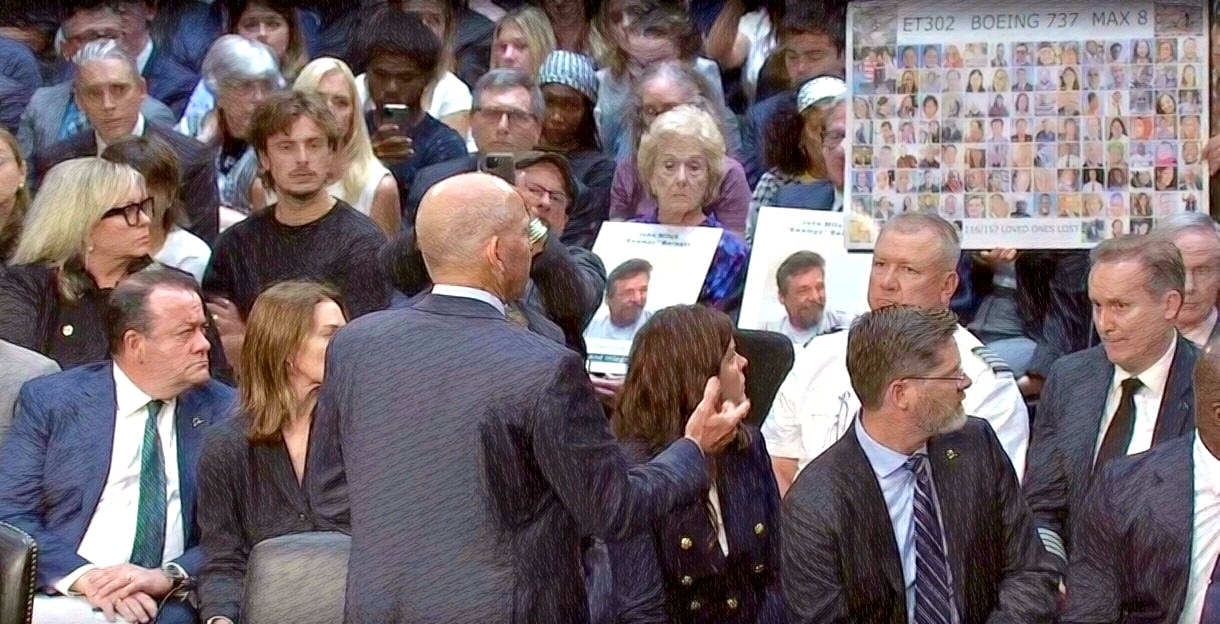
|
David L. Calhoun Opening Statement on Boeing Safety Culture Before the Senate Permanent Subcommittee on Investigations delivered 18 June 2024, U.S. Capitol Building, Washington, D.C.
Audio mp3 of Address Audio AR-XE mp3 of Address
[AUTHENTICITY CERTIFIED: Text version below transcribed directly from audio] Chairman Blumenthal, Ranking Member Johnson, Members of the Subcommittee: Thank you for inviting me to appear before you today along with Boeing's Chief Engineer, Howard McKenzie, seated to my right. Before I begin my opening remarks, I would like to speak directly to those who lost loved ones on Lion Air Flight 610 and Ethiopian Airlines Flight 302.
Nearly every second, a Boeing commercial or defense product takes off and lands somewhere around the world, making us responsible for the safety of millions of passengers and flight crews every day, including our men and women in uniform. Aerospace safety is built on a robust industry-wide system that relies on self-disclosure, accountability, and continuous learning. This scrutiny -- to be held to the very highest standard -- is fundamental to why commercial aviation is by far the safest mode of transportation today. I come from this industry, and I know full well that this is an industry where we simply must get it right -- every single time. I’ve served as President and CEO of Boeing since January of 2020, following these tragic accidents. I joined the aviation industry as president and CEO of GE Aircraft Engines. My introduction to aerospace safety was after the tragic accident in 1989 of United Airlines Flight 232 in Sioux City, Iowa, due to an uncontained engine failure. It led to sweeping changes in our industry’s safety management processes and contributed significantly to flight safety going forward. And from this experience, I understand the gravity of Boeing’s role in upholding the integrity of aerospace safety in our industry. We deeply regret the impact that the Alaska Airlines Flight 1282 accident had on Alaska Airlines’ team and its passengers, and we are grateful to the pilots and crew for safely landing the plane. We are thankful that there were no fatalities. From the beginning, we took responsibility and cooperated transparently with the NTSB [National Transportation Safety Board] and the FAA [Federal Aviation Association] in their respective investigations. In our factories and in our supply chain, we took immediate action to ensure the specific circumstances that led to this accident would not happen again. Importantly, we went beyond to look comprehensively at our quality and manufacturing systems. And we slowed things down -- dramatically. To launch this more comprehensive look, we’ve held stand downs in our plants, and we've listened to our employees and acted on their ideas. We've brought in an independent quality expert to assess our processes. And, we have announced our intention to re-acquire Spirit AeroSystems, the manufacturer of our fuselage. In consideration of these inputs, Boeing developed a comprehensive safety and quality action plan with very specific metrics, which we will use to hold ourselves accountable and the FAA will use to provide the oversight required. Most importantly, it is our people -- over 170,000 around the world -- who are our greatest strength. We’ve asked every one of our employees to consider themselves an aviation safety advocate. We're committed to making sure every employee feels empowered to speak up if they see a problem. We also have strict policies that prohibit retaliation against employees who come forward. It is our job to listen, regardless of how we obtain feedback, and handle it with the seriousness it deserves. Much has been said about Boeing’s culture. We’ve heard those concerns loud and clear. Our culture is far from perfect, but we are taking action and we are making progress. We understand the gravity, and we're committed to moving forward with transparency and accountability, while elevating employee engagement every step of the way. Our airplanes have carried the equivalent of more than double the population of the planet. Getting this right is critical for our company. It's critical for our customers who fly our planes every day. And it's critical for our country. We're part of a global ecosystem composed of manufacturers, suppliers, airlines, airports, air traffic controllers, and regulators. And they're all committed to learning from every incident. It is this relentless focus on improvement that has led to our industry’s unparalleled safety record. And it is with that mindset, we're taking comprehensive action to strengthen safety and quality. And, we know, as America’s premier aerospace manufacturer, this is what you and the flying public have every right to expect from us. And thank you, Mr. Chairman, and Howard and I are -- will be happy to take your questions. Original Text, Audio, Image (Screenshot) Source: hsgac.senate.gov Original Video Source: C-SPAN.org Audio Note: Female voice whispering near the beginning present at source audio. AR-XE = American Rhetoric Extreme Enhancement Video Note: Stereo enhanced and frame interpolated from 30pfs to 60fps See also: Boeing and the Dark Age of American Manufacturing
And also:
Subcommittee's 17 June 2024 Report on Boeing's
Safety and Quality Practices.pdf
Page Updated: 6/26/24 U.S. Copyright Status: Text and Video = Property of AmericanRhetoric.com. Audio and Image = Fair Use. |
|
|
© Copyright 2001-Present. |
